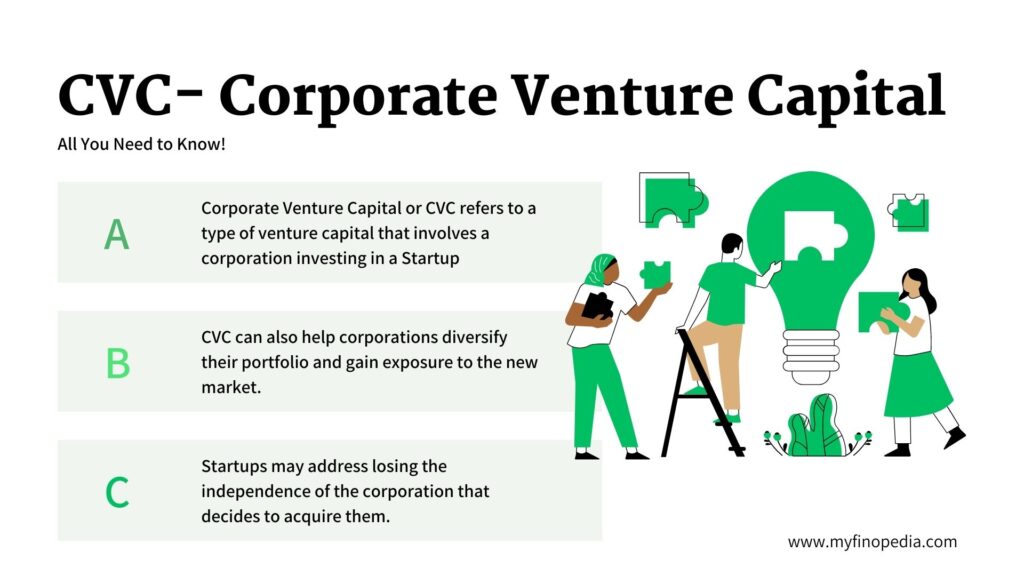Corporate Venture Capital or CVC is a well-known concept in the investment world. It refers to a type of venture capital that involves a corporation investing in a Startup or early-stage company that has long-term potential. CVC has become extremely popular as a means to stay comparative in different market industries. It is a strategic investment for large corporations looking to innovate and stay competitive in their own fields. Let’s look at the potential benefits and drawbacks that CVC includes in this article.
Meaning: Corporate Venture Capital?
Corporate venture capital can be defined as a form of venture capital where corporations invest in external startups or early-stage companies for strategic objectives. Apart from Private Equity (PE) where the investors invests on the giant or equally established companies, in venture capitalism companies usually target small startups with future growth prospects to stay ahead of the competition and uniqueness of their persona. The corporation typically invests with the goal of gaining access to new technologies, products, or services that can help them improve their operations and create new business opportunities.
CVC investments can take many forms such as equity, convertible debt, and strategic partnerships. The investment certificate is made through a dedicated venture capital fund managed by the corporation or through direct investment in the startup. CVC investments are accompanied by strategic support such as mentorship, access to the corporation’s resources, and business development opportunities.
A Brief Walk through History
The term venture capitalist first appeared in the market as early as the 1990s. Microsoft, Intel, etc. tech-industries introduced a new curve but easily broke down within 1-2 years. Yet, as the market research suggests, since then the trend of venture capitalism took a new turn, and by 2000, it profited around $6.2 billion from just $468 million at first.
Nowadays, the field of venture capitalism has crossed across the only the technological world, but massively successful companies like BigBasket, BYJU’S, Zepto, and Porter etc.
The industry was again hit by recession during the period of 2007-2008 when many small startups got affected. However, it did not affect in a negative way as investors were soon attracted to the market through unicorn venture capitalism.
Till now, in the past decade more than 800 companies have made their dimension into startups and opened a new door of investments in various sectors.
Benefits of Corporate Venture Capital
There are several benefits of Corporate venture capital for both corporations and early start-ups. For corporations, CVC offers a way to stay competitive in their respective fields by gaining access to new technology products or services and staying out of the competition. On the other hand, CVC can also help corporations diversify their portfolio and gain exposure to the new market. Also, CVC can provide corporations with the opportunity to engage with emerging entrepreneurs and startups which can lead to potential acquisition or partnership opportunities down the line.
For startups, CVC can provide access to valuable resources such as mental ship industry expertise and business development opportunities. CVC can also provide startups with a strategic partner who can help them navigate the complexity of scaling their business and entering new markets. Additionally, CVC investments can provide startups with a significant amount of capital, which can help them accelerate their growth and reach profitability faster than they would have otherwise.
Drawbacks of Corporate Venture Capital
Well, there are so many benefits of CVC, but there are also some drawbacks to consider. Here are the following:-
- One potential drawback of CVC is that it can come with strings attached. Corporations may have specific strategic objectives that they want to fulfil by the startup, which can lead to conflicts of interest if the statutes of subjective do not align with the Corporation.
- Corporations may have a different risk profile than traditional venture capital firms. It can lead to a more conservative investment approach.
- It can be difficult for first startups to navigate the complex corporate environment. Startups struggle to integrate with the corporation existing operations may find it challenging to work with multiple stakeholders with the corporation.
- Startups may address losing the independence of the corporation that decides to acquire them.
Conclusion
Corporate venture capital is an available tool for corporations looking to stay competitive in their respective industries by gaining access to new technology products or services. It is a way to expand the market and grow the business industry exponentially. In recent years, startup culture has been poised as a new way to drive future growth. As such, we can expect to see this continued growth of the CVC market for many years to come.






